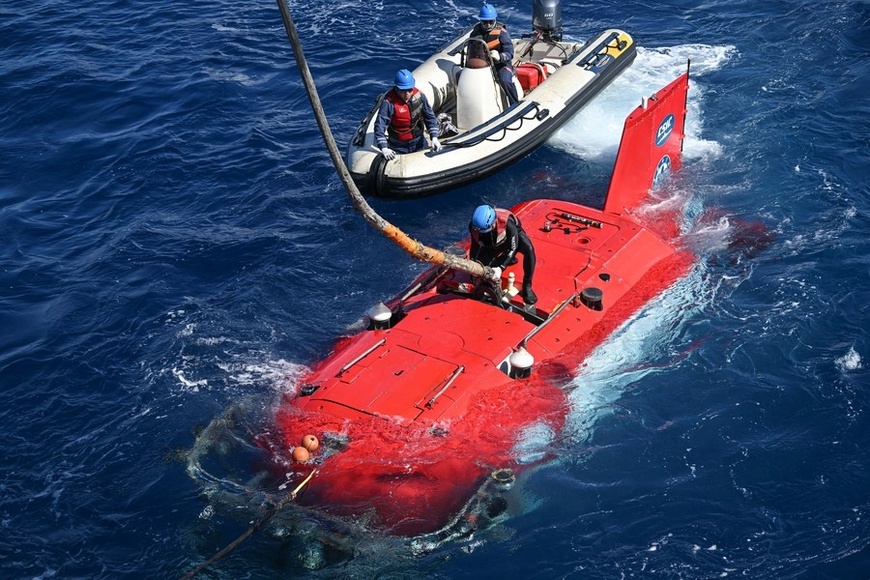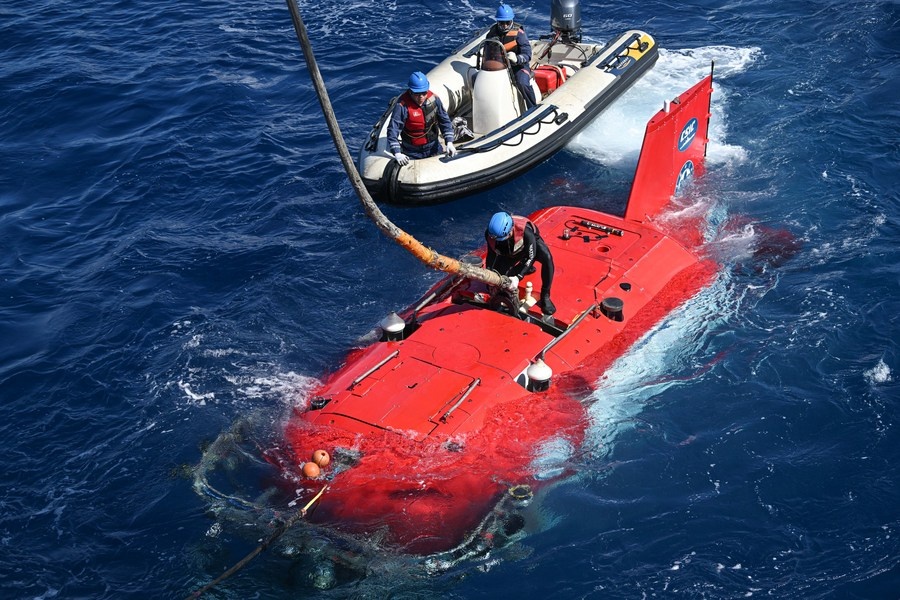By Ding Duo

A hydronaut unhitches the rope on the crewed submersible Shenhai Yongshi (Deep Sea Warrior) from the scientific research ship Tan Suo Yi Hao (Discovery One) to make preparations for underwater investigation in the South China Sea, May 26, 2023. (Xinhua/Pu Xiaoxu)
Each year around July 12, international discourse resurfaces regarding the so-called South China Sea arbitration and its so-called "award." This year has been no exception.
The renewed attention is driven not only by the strategic miscalculations of certain countries concerning the South China Sea issue, as they seek to legitimize the arbitration and reinforce their unilateral claims, but also by the deliberate attempts of certain extra-regional forces to stoke regional tensions and sow discord between China and ASEAN countries.
While the international community widely recognizes China's position of non-acceptance, non-participation, and non-recognition of both the arbitration process and its outcome, a small number of countries continue to underestimate how the "award" has disrupted efforts by parties concerned to properly handle the South China Sea issue. Furthermore, they overlook its serious damage to the fairness and credibility of international dispute settlement mechanisms, as well as its detrimental impact on the international order underpinned by international law.
The "award" violates the basic principles of international law.
Proponents claim that the ruling "constitutes international law", claiming it holds legally binding force as an outcome of the arbitral tribunal established under UNCLOS dispute settlement mechanisms. However, the tribunal was set up unilaterally at the Philippines' request, violating the cornerstone principle of state consent in international jurisprudence. It exceeded its jurisdictional mandate and issued an award containing substantial factual inaccuracies and legal misinterpretations, rendering it fundamentally invalid and devoid of legal force.
The "arbitral tribunal" improperly addressed matters of territorial sovereignty - explicitly excluded from UNCLOS jurisdiction - while disregarding China's formally stated positions. It uncritically endorsed the Philippines' curated submissions, effectively imposing a de facto ruling on territorial rights. This contravenes the fundamental principles of judicial restraint and procedural prudence observed by international judicial bodies.
Moreover, under the guise of "interpretation," the tribunal engaged in de facto lawmaking - arbitrarily revising or inventing rules of maritime law on issues such as "historical rights," "the integrity of archipelagos," and "the regime of islands." Such distortions violate established legal doctrine and undermine the role of sovereign states as the primary subjects of international law.
The "award" runs counter to the principles of fairness and justice.
International judicial institutions exist to uphold fairness, yet a tribunal established amid perceived geopolitical motives cannot fulfill this mandate. Procedural concerns are exemplified by Shunji Yanai, then president of the International Tribunal for the Law of the Sea, who presided over the tribunal's formation while concurrently chairing Japan's Advisory Panel on Reconstruction of the Legal Basis for Security - a body actively strengthening the U.S.-Japan alliance and coordinating policies on the Diaoyu Islands.
Procedural irregularities further undermine the ruling's legitimacy. The tribunal repeatedly permitted - and at times encouraged - the Philippines to submit supplementary "evidence" far beyond established deadlines. These submissions were accepted without rigorous scrutiny or cross-examination of expert testimony, violating fundamental evidentiary standards of international law.
The "award" impedes genuine dispute resolution.
The South China Sea issue involves complex overlapping territorial and maritime claims, influenced by historical, political, and legal factors. It cannot be resolved through a unilaterally initiated, procedurally flawed "award" in the absence of regional consensus. Current stability stems not from this arbitration but despite it. Persistent assertions treating the "award" as binding international law - or expectations that China would accept a ruling devoid of fairness and legitimacy - only obstruct meaningful resolution.
China neither accepts nor recognizes the "award," and will never accept any claim or action arising from the award. The country is committed to safeguarding the legitimate rights and interests accorded by international law, including UNCLOS, while preserving the integrity, seriousness, and authority of international law itself.
Achieving a durable resolution to the South China Sea issue requires restraint, patience, and goodwill from all parties involved. Any solution must be rooted in respect for historical facts and guided by the principles of understanding and cooperation enshrined in international law. Only through such collective efforts can the relevant parties jointly maintain the hard-won peace and stability in the South China Sea and forge a future of mutual benefit and win-win cooperation.
(Ding Duo is the director of the Center for Area Studies, National Institute for South China Sea Studies.)
The renewed attention is driven not only by the strategic miscalculations of certain countries concerning the South China Sea issue, as they seek to legitimize the arbitration and reinforce their unilateral claims, but also by the deliberate attempts of certain extra-regional forces to stoke regional tensions and sow discord between China and ASEAN countries.
While the international community widely recognizes China's position of non-acceptance, non-participation, and non-recognition of both the arbitration process and its outcome, a small number of countries continue to underestimate how the "award" has disrupted efforts by parties concerned to properly handle the South China Sea issue. Furthermore, they overlook its serious damage to the fairness and credibility of international dispute settlement mechanisms, as well as its detrimental impact on the international order underpinned by international law.
The "award" violates the basic principles of international law.
Proponents claim that the ruling "constitutes international law", claiming it holds legally binding force as an outcome of the arbitral tribunal established under UNCLOS dispute settlement mechanisms. However, the tribunal was set up unilaterally at the Philippines' request, violating the cornerstone principle of state consent in international jurisprudence. It exceeded its jurisdictional mandate and issued an award containing substantial factual inaccuracies and legal misinterpretations, rendering it fundamentally invalid and devoid of legal force.
The "arbitral tribunal" improperly addressed matters of territorial sovereignty - explicitly excluded from UNCLOS jurisdiction - while disregarding China's formally stated positions. It uncritically endorsed the Philippines' curated submissions, effectively imposing a de facto ruling on territorial rights. This contravenes the fundamental principles of judicial restraint and procedural prudence observed by international judicial bodies.
Moreover, under the guise of "interpretation," the tribunal engaged in de facto lawmaking - arbitrarily revising or inventing rules of maritime law on issues such as "historical rights," "the integrity of archipelagos," and "the regime of islands." Such distortions violate established legal doctrine and undermine the role of sovereign states as the primary subjects of international law.
The "award" runs counter to the principles of fairness and justice.
International judicial institutions exist to uphold fairness, yet a tribunal established amid perceived geopolitical motives cannot fulfill this mandate. Procedural concerns are exemplified by Shunji Yanai, then president of the International Tribunal for the Law of the Sea, who presided over the tribunal's formation while concurrently chairing Japan's Advisory Panel on Reconstruction of the Legal Basis for Security - a body actively strengthening the U.S.-Japan alliance and coordinating policies on the Diaoyu Islands.
Procedural irregularities further undermine the ruling's legitimacy. The tribunal repeatedly permitted - and at times encouraged - the Philippines to submit supplementary "evidence" far beyond established deadlines. These submissions were accepted without rigorous scrutiny or cross-examination of expert testimony, violating fundamental evidentiary standards of international law.
The "award" impedes genuine dispute resolution.
The South China Sea issue involves complex overlapping territorial and maritime claims, influenced by historical, political, and legal factors. It cannot be resolved through a unilaterally initiated, procedurally flawed "award" in the absence of regional consensus. Current stability stems not from this arbitration but despite it. Persistent assertions treating the "award" as binding international law - or expectations that China would accept a ruling devoid of fairness and legitimacy - only obstruct meaningful resolution.
China neither accepts nor recognizes the "award," and will never accept any claim or action arising from the award. The country is committed to safeguarding the legitimate rights and interests accorded by international law, including UNCLOS, while preserving the integrity, seriousness, and authority of international law itself.
Achieving a durable resolution to the South China Sea issue requires restraint, patience, and goodwill from all parties involved. Any solution must be rooted in respect for historical facts and guided by the principles of understanding and cooperation enshrined in international law. Only through such collective efforts can the relevant parties jointly maintain the hard-won peace and stability in the South China Sea and forge a future of mutual benefit and win-win cooperation.
(Ding Duo is the director of the Center for Area Studies, National Institute for South China Sea Studies.)
 Menu
Menu
 Exposing the illegitimacy of the South China Sea arbitration and its so-called 'award'
Exposing the illegitimacy of the South China Sea arbitration and its so-called 'award'
















